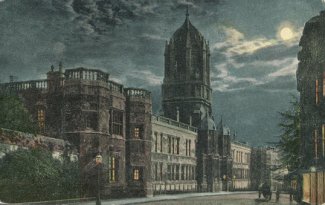|
The Rhodes and |
Gabriele H. |
|
Gabriele: “Am I worth the food it takes to feed me?”
I applied for the Rhodes, Marshall, and Mitchell scholarships, but only in the Rhodes application did I make it to the interview stage, so my comments will be focused on that application. I found the application process time consuming and rarely fun. Yet I would encourage those reading this page to consider applying. In my own experience, I have never regretted applying for a scholarship or school that I didn't get or get into, but I have several times regretted not applying for schools or scholarships, however long the odds.
Reasons to apply
Looking back I think I gained two very important things from this application. The first was to think of myself in terms of what I contributed to society in a serious way. Over the summer after graduation, preparing my essays, I asked, am I worth the food it takes to feed me? what do I do for my community? Writing the Rhodes, Mitchell, and Marshall application essays gave me the opportunity to think formally about my moral and social obligation to redress injustice, a question that I had already been thinking a great deal about in the context of my thesis. In doing so, I clarified some beliefs and discarded others. In part because of this self-reflection, I began volunteering at the Oregon Council for Hispanic Advancement as an ESL tutor; volunteering there has been engaging and rewarding far beyond the context of the Rhodes application. As a result of my Rhodes application I also greatly improved my ability to present myself, in both an interview and in a social setting. Reed professors and mock interviewers gave me constant encouragement, advice, and criticism. The mock interviews that Reed offered, as well as the interviews that I had at Reed and at the State Finals, improved my confidence in myself and my ability to communicate my ideas to others. I spent a great deal of time working to improve my ability to confidently present my political ideas and social interests in a way that would be true to my beliefs and yet credible to potentially conservative judges. This practice has already proven immensely helpful to me in various work or volunteer related social contexts, and will be very helpful to me in all further job, scholarship, and school applications.
The Interview
I had applied for a second BA in Spanish and English literature. The interview went something like this:
Mary King: You spent some time in Santiago de Compostela, is that right? What surprised you most in your time there?
[I talked about the Galician language]
Pamela Jacklin: So what do you think about bilingual
education in the
[I made various arguments in favor]
PJ: You still haven't answered the question, though, is it
feasible to have bilingual education in the
After I answered that question, Dean Marvin Henberg asked an opening question about my photography, and then asked why I preferred photographing people over inanimate objects. Finally, he asked me to describe the relationship between the processes of writing and those of photography.
Paulette Bierzychudek: What is global warming?
[I tried with limited success to give a technical description, and anticipated the likely follow-up question on the Kyoto protocol and the then-recent negotiations on expanding the protocol].
PB: What would you have advised the Germans to do, take the
revised agreement the
Finally, Javed Siddiqi asked me why there had never been a
coup in
In general, I think that the interview went well. With the exception of the last question, all the questions in the interview sprang from my application materials, and I prepared answers to most of them, directly or indirectly. If the interview lagged at all, it was because I was giving somewhat prepared answers; I wasn't thinking on my feet enough. I left the interview feeling I had done well and impressed at least some of the judges. However, in a year with many brilliant and engaging applicants, it was not sufficient. The four applicants that Caitlin and I thought were favorites, including the two who finally earned a nomination, had incredibly smooth, sincere social graces. Throughout the process, I feared that not earning a nomination would be a blow to my self-confidence, but afterwards I found my self-confidence had increased knowing that I had done well in such company.
Christ Church, Oxford |
|
||

